

PH DIPLO
AN INITIATIVE OF THE PUBLIC HEALTH DIPLOMACY LAB
UNIVERSITY OF MEMPHIS SCHOOL OF PUBLIC HEALTH
INAUGURAL EDITION | SEPTEMBER 2025
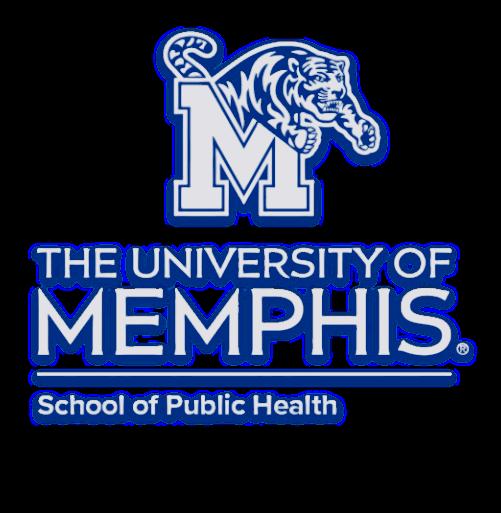
University of Memphis | School of Public Health
Editorial Team
Diyala Abdlrasul, MPP
Coordinator of Communication and Events
Kami Geron, MA
Instructional Designer and Coordinator of Special Projects
Niharika Jha, MPH
PhD Candidate and Graduate Assistant
Laura Granack, MS
SPH Coordinator for the Dean
Follow the School of Public Health

Inaugural Issue #1 | September 2025
A QUARTERLY PUBLICATION
University of Memphis
School of Public Health
memphis.edu/publichealth
July
September
Inaugural
November
December

April
May
June

of Memphis | School of Public Health
University
Dean’ s Message

There is an urgent need to tackle numerous global health threats in the 21st century. Scholars and practitioners have recognized the importance of health in relation to other political issues such as trade, security and development. The COVID-19 pandemic exemplified how quickly emerging infections can spread, costing lives and restricting travel and trade among interdependent economies. Growing numbers of countries have become increasingly more engaged in health policies.
Increased involvement among diplomatic and public health forums to improve understanding of the interlinkages between foreign policy and global health is the need of the hour. However, countries and their representatives do not interact solely through traditional diplomatic channels. Commitment to local, regional and global cooperation and governance is of paramount importance. Few public health programs offer technical, cross-cultural, management and negotiation training for health professionals from a multinational perspective.
There is a need to design and negotiate frameworks and agreements that can address global health challenges in a collective manner. It is crucial to work across different sectors with various actors that can influence public health outcomes. To address these complex relationships, interdependencies and interconnectedness between health relationships and other factors such as trade and economy, a skilled workforce that focuses on concepts and theories that can be applied at the intersection of international relations, global health and policy through the understanding of broad stakeholder engagement, consensus building, negotiations and outcomes.
This quarterly publication aims to bring together the latest updates on public health diplomacy and presents perspectives and insights across different stakeholders including academicians, members of the civic society, non-governmental organizations, industry partners and policymakers.
Ashish Joshi | PhD, MBBS, MPH


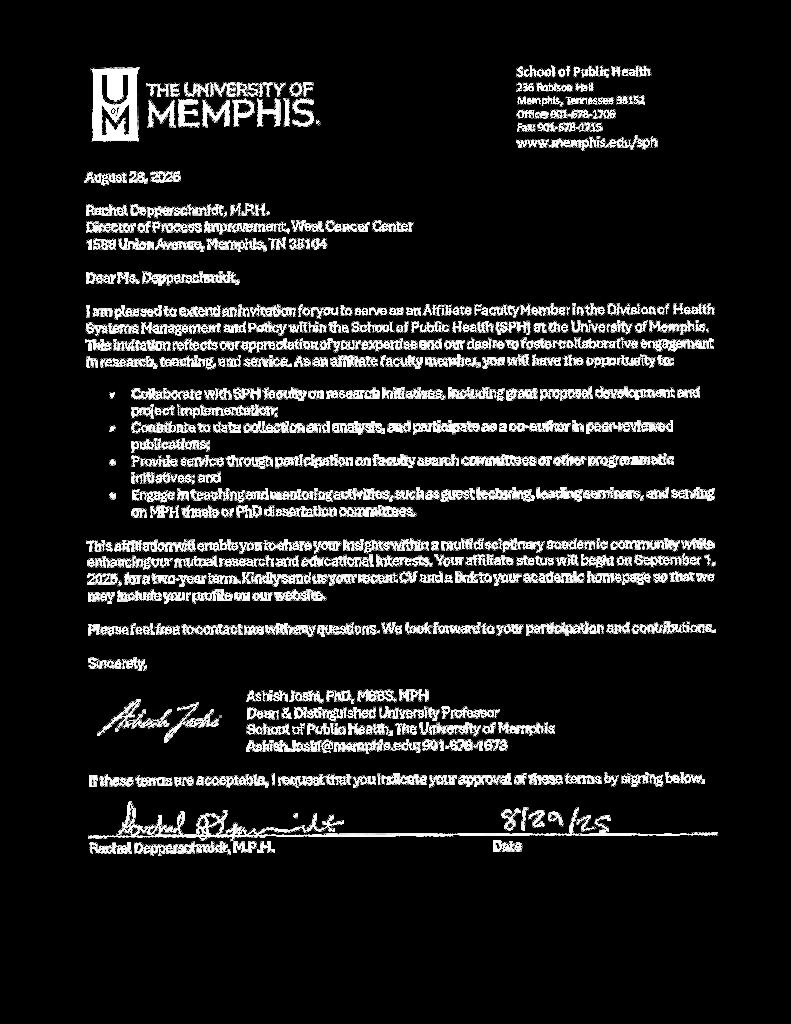
University of Memphis | School of Public Health
Nation’ s First Public Health Diplomacy Lab
July 2024
Launch of the Public Health Diplomacy Lab
In July 2024, the University of Memphis's School of Public Health launched the Public Health Diplomacy Lab — the first of its kind in the United States. Led by Dean Dr. Ashish Joshi, the PHD Lab is a hub for knowledge generation, advocating for participatory, collaborative and strategic approaches to improve the health and well-being of all populations across various geographic settings.
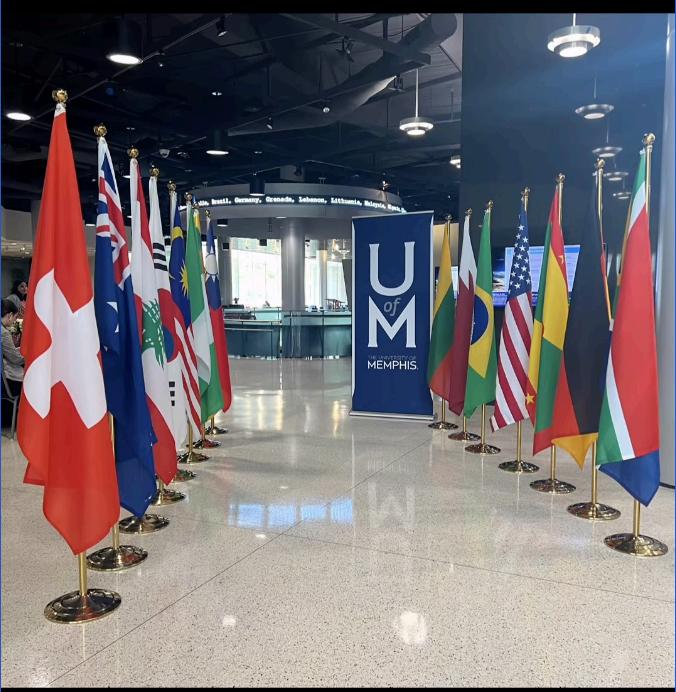
1 | Public Health Diplomacy Lab

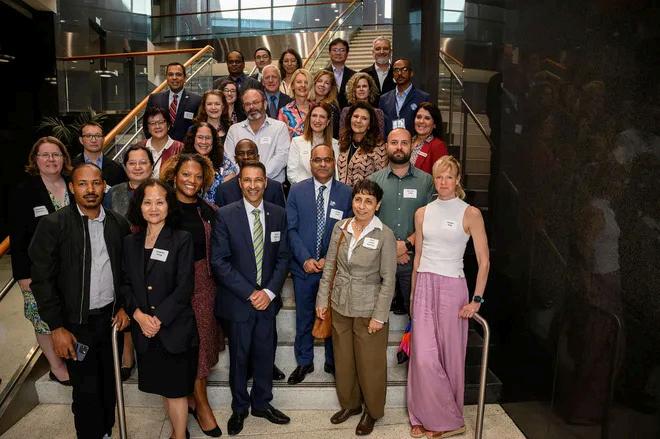
University of Memphis Public Health Diplomacy Team
The Public Health Diplomacy Lab at UofM is led by a multidisciplinary team dedicated to advancing global health through collaboration, innovation and evidence-informed diplomacy. In this effort, researchers, policymakers and experts from diverse fields — including public health, sociology, epidemiology and international relations — work together to address complex health challenges and promote improved access to health worldwide.
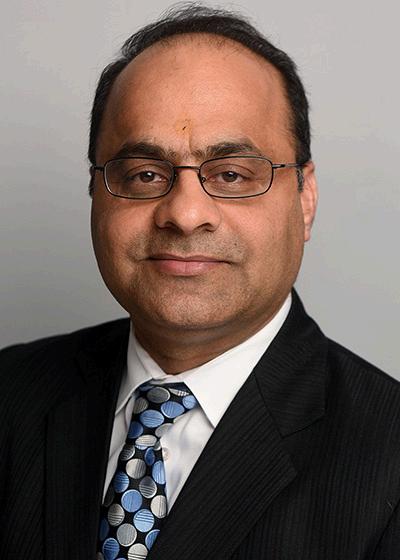
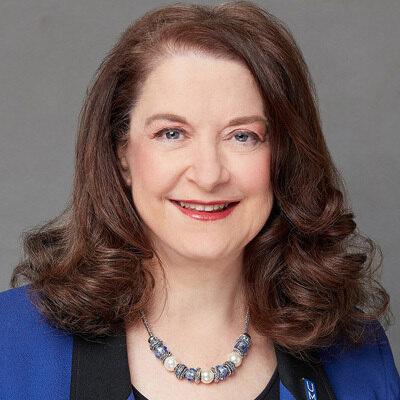
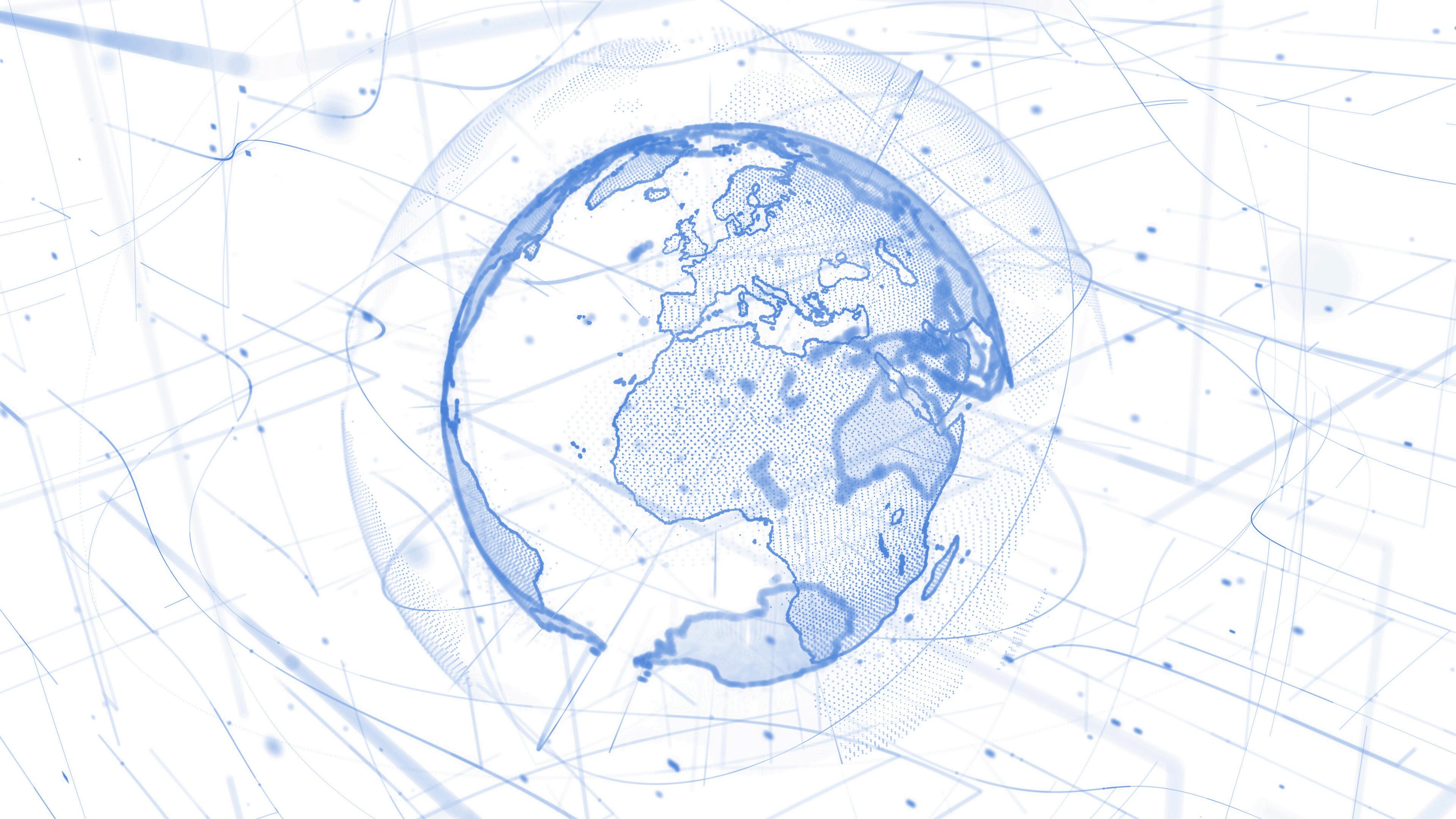
Dr. Ashish Joshi
Dean and Distinguished Professor, School of Public Health
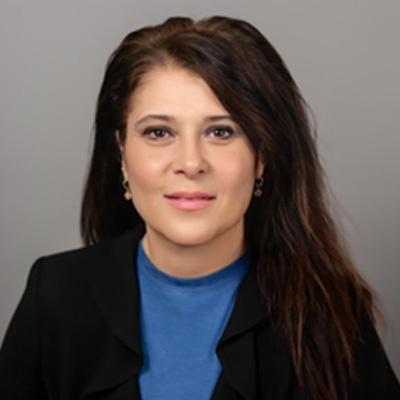
Dr. Marian Levy
Associate
Dean, Public Health Practice and Community Engagement

Dr. Diana Ruggiero
Professor of Spanish, Department of World Languages and Literatures
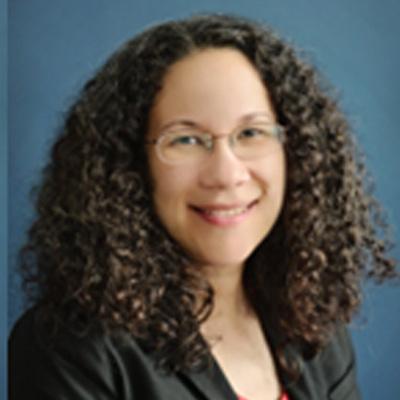
Dr. Beverly Tsacoyianis
Associate Professor of History
Dr. Gretchen Peterson
Professor, Department of Sociology
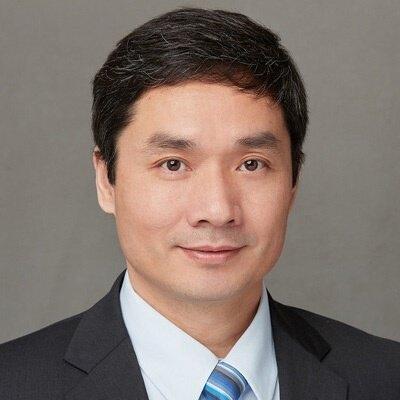
Dr. Xinhua Yu
Associate Professor of Epidemiology, Program Coordinator Epidemiology

University of Memphis | School of Public Health
September 2024
Inaugural Public Health Diplomacy Summit in Collaboration with ASPPH and GNAPH
From Sept. 25-27, 2024, the UofM hosted the first Public Health Diplomacy Summit in collaboration with the Association of Schools and Programs of Public Health (ASPPH) and the Global Network for Academic Public Health (GNAPH). The summit convened 29 experts from 15 countries to discuss the role of public health diplomacy in addressing global health issues.

Contributing Organizations and Participants
Global Network for Academic Public Health (GNAPH) Association of Schools and Programs of Public Health (ASPPH)
Dr. Laura Magaña, President and CEO, ASPPH
Dr. Ashish Joshi, dean and distinguished professor, School of Public Health, University of Memphis, Memphis, Tenn.
Dr. Kun-Hsien Tsai, associate dean and professor in the Department of Public Health at the College of Public Health, National Taiwan University, Taiwan (R O C )
Dorothy Biberman, senior director of Global Engagement and Executive Initiatives
Dr. Diana Maddah, senior health advisor, Risk Communication and Community Engagement and Research UK-Med, Qatar
Dr. Kerry Mitchell, assistant dean of students, associate professor and chair, Department of Public Health and Preventive Medicine, St George’s University, Grenada, West Indies
Asia-Pacific Academic Consortium for Public Health (APACPH)
Prof. So Yoon Kim, Department of Medical Law and Ethics, Yonsei University, South Korea
Dr. W. Bradley Hawkins, practicum director, Vanderbilt MPH Program, Nashville, Tenn.
Dr. Shafik Dharamsi, dean and professor, University of North Texas Health Science Center, School of Public Health
Dr. Jihad Makhoul, professor, American University of Beirut, Faculty of Health Sciences, Lebanon
Dr. Rodrigo Reis, assistant vice-provost and director, Office of Public Health, Washington University in St. Louis, Mo.
Dr. Marian Levy, associate dean, Public Health Practice and Community Engagement, University of Memphis, Memphis, Tenn.
Dr Xinhua Yu, associate professor, University of Memphis, Memphis, Tenn
Prof. Wah Yun Low, deputy executive director (Research & Internationalization), Asia-Europe Institute, University Malaya, Malaysia Association of Schools of Public Health in Africa (ASPHA)
Dr. Woldekidan Amde, researcher, University of the Western Cape School of Public Health, South Africa
Dr. Glory Nja, senior lecturer, Department of Public Health, University of Calabar, Nigeria Council of Academic Public Health Institutions Australia (CAPHIA)
Dr. Bridget Kelly, associate professor, University of Wollongong, Australia
Bernard Saliba, Lecturer, University of Technology Sydney, Australia Association of Schools of Public Health in the European Region (ASPHER)
Prof. Dr. Ramunė Kalėdienė, head of department of Health Management, Lithuanian University of Health Sciences, Lithuania
Giada Scarpetti, Technische Universität Berlin Department of Healthcare Management, Germany Latin American Alliance for Global Health (ALSAG)
Dr. Erica Kastrup, Cooperation Advisor, Researcher at the CRIS Center for International Relations in Health of the Oswaldo Cruz Foundation, Brazil
South East Asia Public Health Education Institutions Network (SEAPHIN)
Dr. Rajendra Surenthirakumaran, Dean and Professor, Faculty of Medicine, University of Jaffna, Sri Lanka World Federation of United Nations Associations (WFUNA)
William Yotive, Model UN Coordinator
Subject Matter Experts
Catherine Kane, Technical Officer, World Health Organization, Switzerland
Dr. Tim Ken Mackey, Professor, Global Health in the Global Health Program at UC San Diego, Director Global Health Policy and Data Institute
Dr. Matthew Brown, Special Advisor, Global Health Policy and Data Institute, Adjunct Professor, Uniformed University of the Health Sciences, Bethesda, MD, USA

University of Memphis | School of Public Health
Public Health Diplomacy Summit Gallery
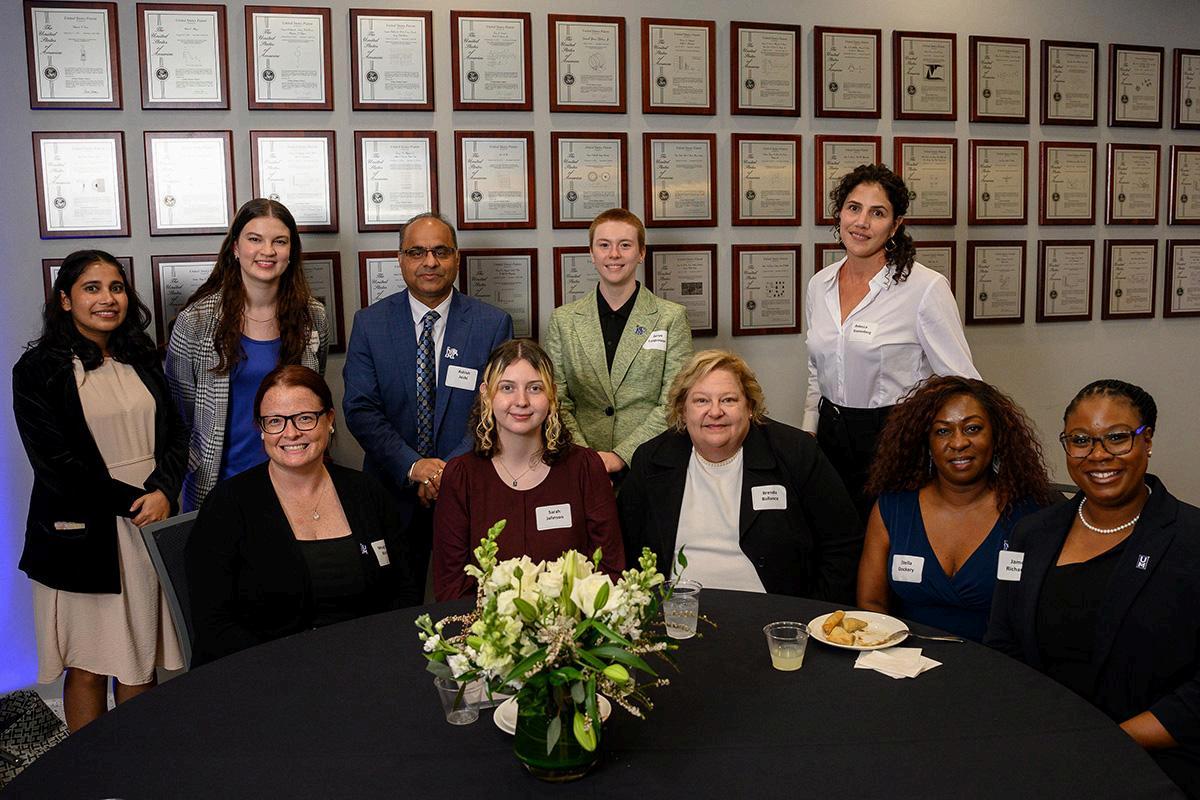

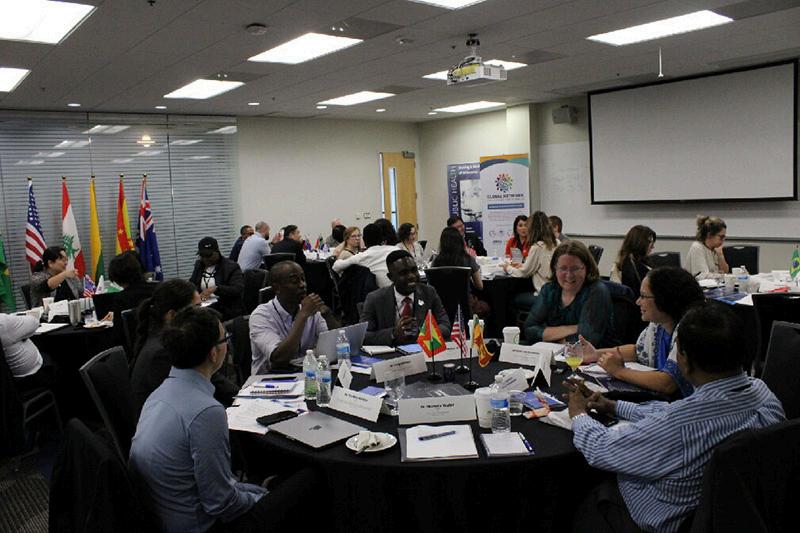
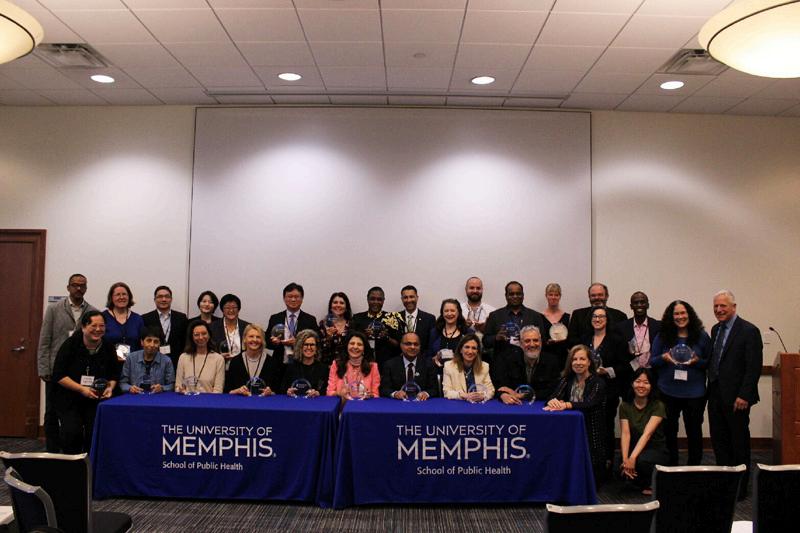
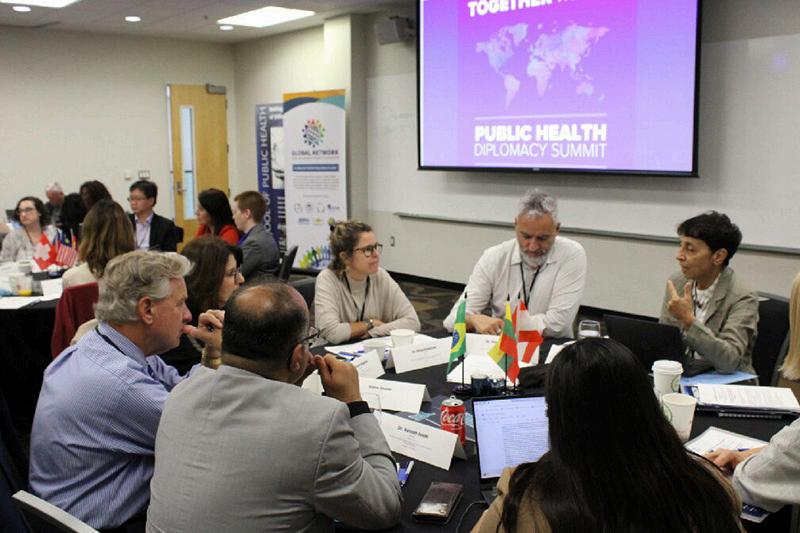

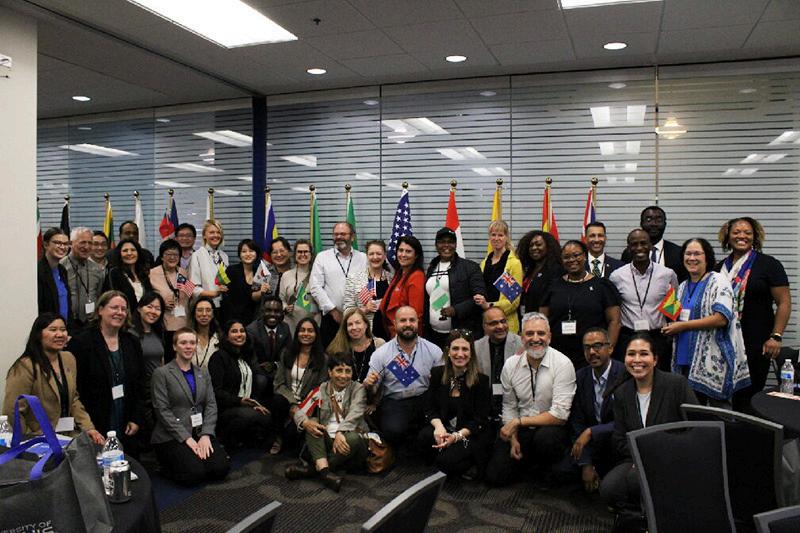
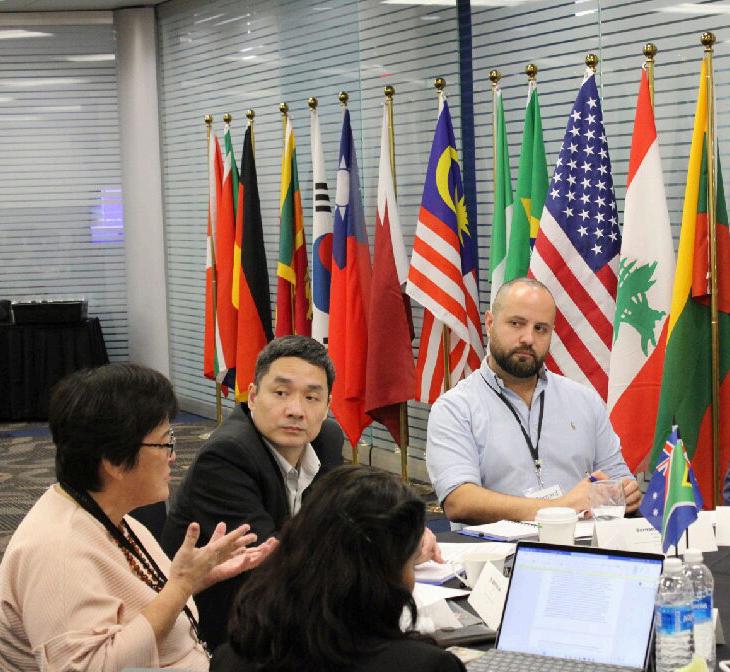
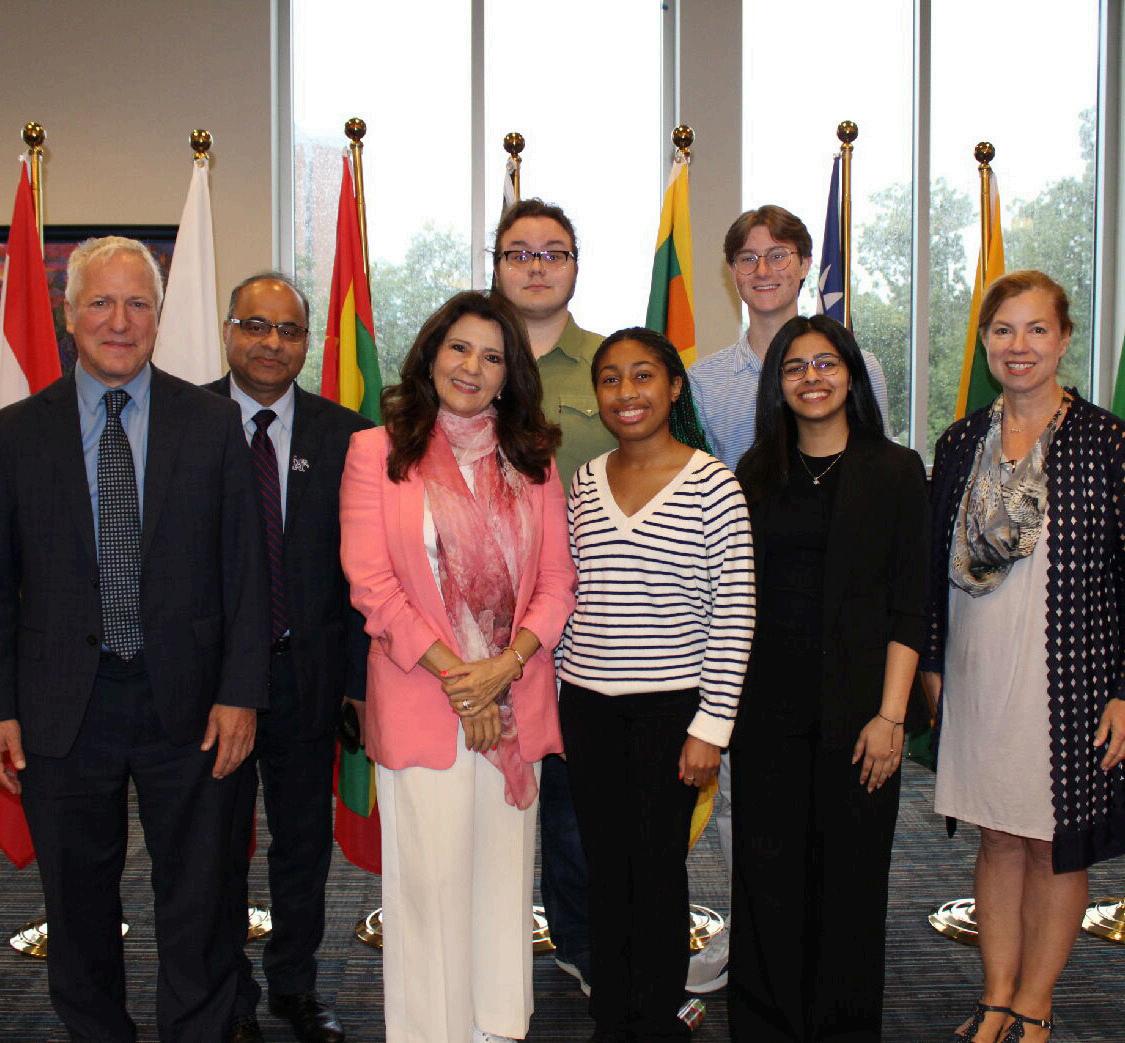
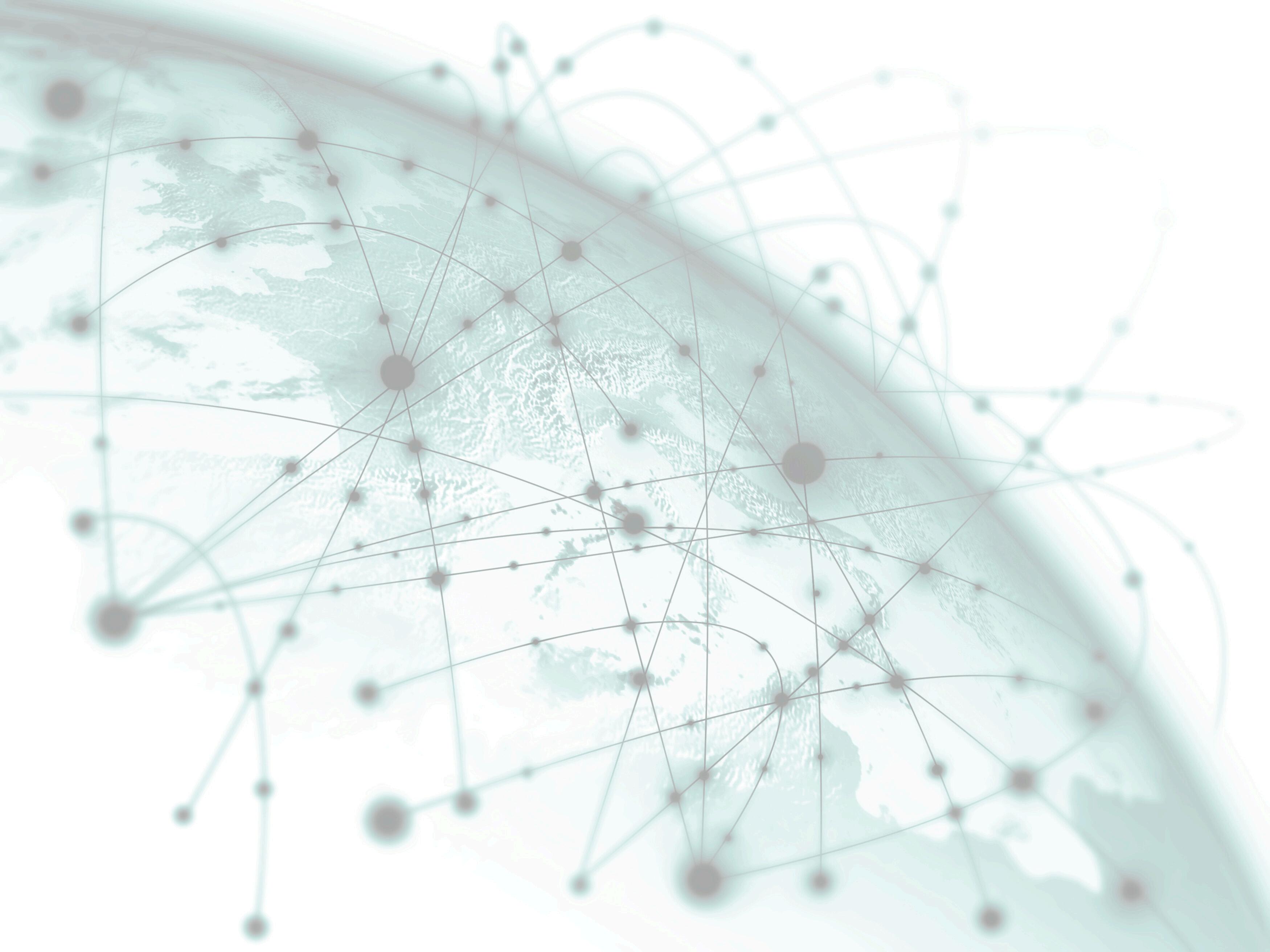
A Way Forward from Inaugural Summit
Defining Public Health Diplomacy
“Public health diplomacy is a multidisciplinary field that enables its practitioners to effectively communicate, facilitate, negotiate and build consensus using systems thinking, evidence-based, community-informed approaches, based on equity-focused and human-centered values to improve health and well-being for all, ” Public health diplomacy: summary of the methods and outcome of the 1st University of Memphis School of Public Health Diplomacy Summit Ashish Joshi et al, Frontiers.
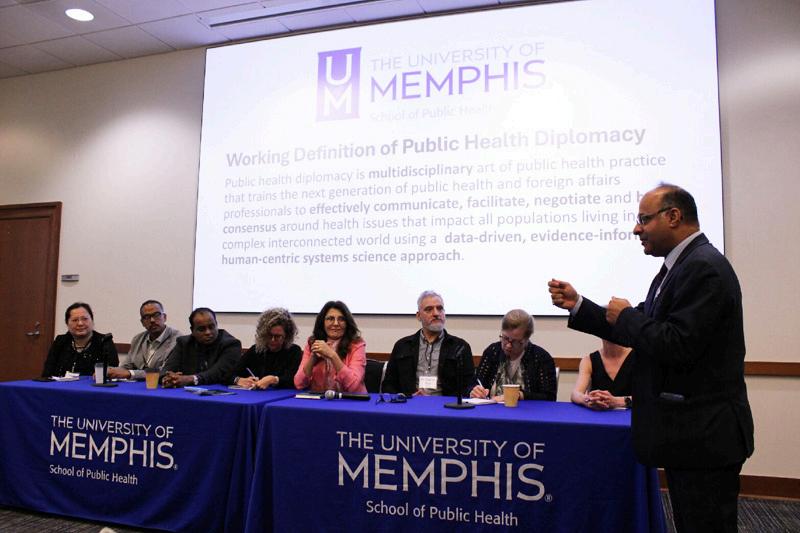

University of Memphis | School of Public Health
Key Outcomes and Guiding Principles
Summit and Nine-Point Action Plan
The summit resulted in a definition and a nine-point action plan, including the establishment of a global Public Health Diplomacy Working Group.
1. Establish a Public Health Diplomacy Working Group globally. Member schools and programs from ASPPH and GNAPH will be invited to participate.
2. Create Public Health Diplomacy capacity-building group globally that will work with key public health training and academic institutions across various regions to gather insights into the skills and competencies essential for public health students.
3. Identify global and region-specific learning outcomes to prepare public health students to succeed in an interconnected and complex world through public health diplomacy.
4. Advance public health diplomacy initiative by engaging decision-makers and stakeholders (including foreign services, ministries of health, academic institutes, civil society members, policy makers and other international organizations like WHO and UN) in your own region to create more awareness about the field.
7 | Public Health Diplomacy Lab
5. Develop an online, interactive resource hub to disseminate Public Health Diplomacy Research, Innovation, Skills and Experiential (PHD-RISE) learning opportunities globally.
6. Organize events to help raise awareness about public health diplomacy in the field of public health
7. Analyze and share the region’s experiences, best practices and achievements in public health diplomacy across various communication outlets to further develop the field.
8. Expand regional and institutional partnerships in collaboration with the University of Memphis School of Public Health, ASPPH and GNAPH to advance public health diplomacy.
9. Disseminate recommendations from participants to their respective institutions to move forward.

Our Collaborators on Public Health Diplomacy
“The Public Health Diplomacy Working Group in the lab at the University of Memphis School of Public Health serves as a global platform for collaboration among academic institutions, public health professionals, policymakers and civil society organizations. Its primary aim is to advance the field of public health diplomacy by fostering dialogue, sharing best practices and developing competencies essential for addressing global health challenges, ” said SPH Dean Ashish Joshi.
Participants shared their perspectives and provided valuable insight about the skills and competencies that could be universally applicable and those that are specific across different regions and essential for preparing a public health diplomat workforce to address public health challenges of the 21st century in a rapidly changing environment.
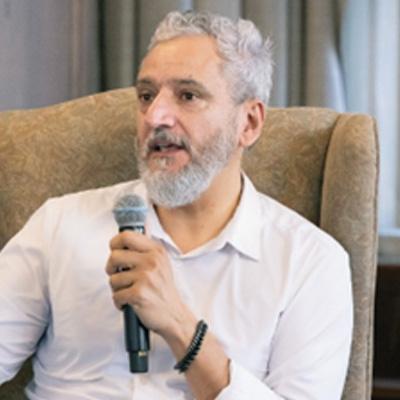
Dr. Rodrigo Reis
Assistant Vice-Provost and Director, Office of Public Health, Washington University in St. Louis, Mo., USA
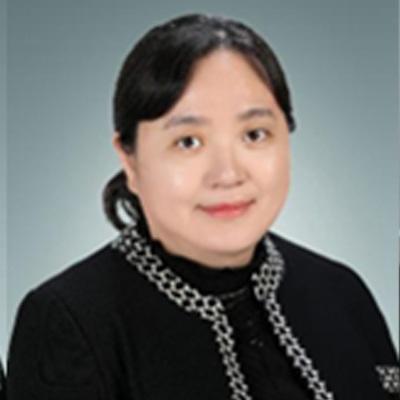
. So Yoon Kim
Professor, Yonsei University, President of APACPH, Korea Region Office, South Korea

Dr. Matthew Brown
Special Advisor, Global Health Policy and Data
Institute, Adjunct Professor, Uniformed University of the Health Sciences, Bethesda, Md., USA
Prof
University of Memphis | School of Public Health
Public Health Diplomacy in the World
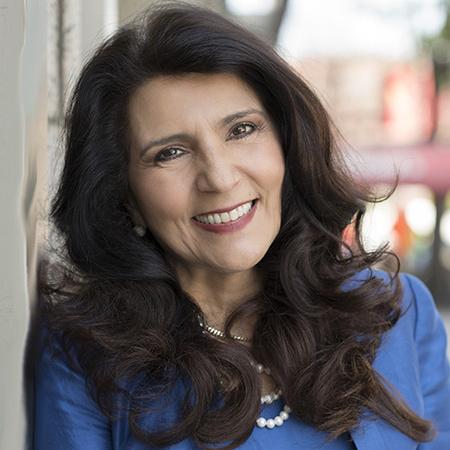
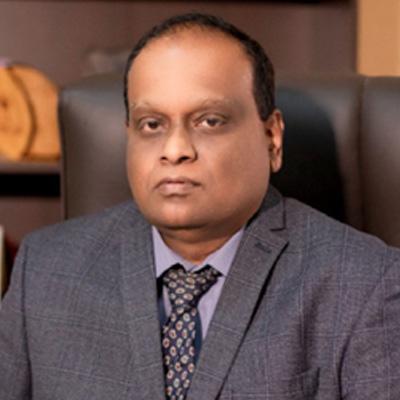

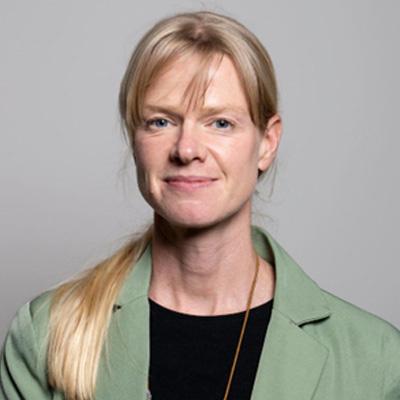
“Health diplomacy is not just about negotiating policies it is about building bridges across communities and borders, fostering trust and ensuring that the well-being of people is a shared local, regional and global priority, ” said Dr. Laura Magaña, president and chief executive officer, Association of Schools and Programs of Public Health (ASPPH)
"In the emerging multipolar world, public health diplomacy must deftly navigate complex global health challenges, using the tools of diplomacy to build trust, foster cooperation and promote peace and stability, " said Dr. Rajendra Surenthirakumaran, dean, Faculty of Medicine, University of Jaffna
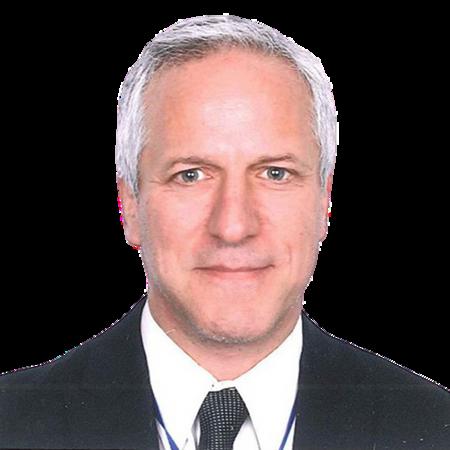
"The Public Health Diplomacy Lab represents a vital step toward integrating science, policy and international cooperation to address global health challenges, ensuring that public health efforts are grounded in equity, informed by evidence and empowered by diplomacy, ” said William Yotive, Model UN coordinator, World Federation of United Nations Associations

“Health is at the core of human rights, yet we are in an embattled time for public health. It is incumbent on us to equip current and future health workers with the knowledge, skills and competencies of public health diplomacy to listen, digest, analyse and advocate for a shared future of #HealthForAll, ” said Catherine Kane, technical officer World Health Organization (WHO )
“Diplomacy is an essential skill for public health practice; the most critical health challenges, such as pandemics, climate change and health inequities, do not respect borders or politics. Solutions require collaboration, negotiation and trust across sectors and nations, " said Dr. Bridget Kelly, associate professor, University of Wollongong, Australia
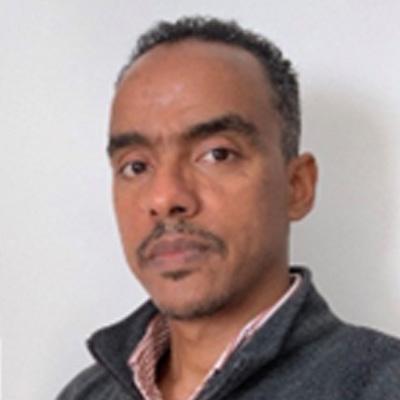
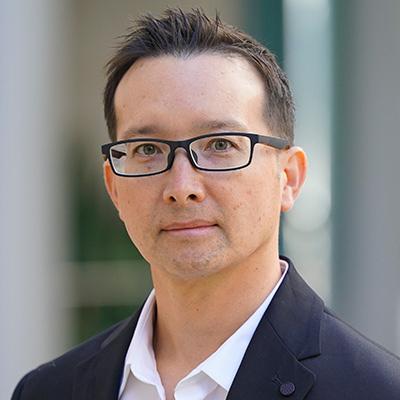
"Africa remains at the periphery of key decision-making spaces that shape the continent’s public health trajectory. As we forge ahead in advancing the field of public health diplomacy, it is imperative to apply a critical lens to how it is framed, operationalised and measured to ensure it is firmly grounded in principles and partnerships that promote equity and health for all, " said Dr. Woldekidan Amde, senior researcher, University of the Western Cape, South Africa
“Research, advocacy and the practice of health diplomacy arguably has never been more important As global health governance undergoes major shifts, the collective public health community will need to be united in continuing to pursue a health in all policies and governance approach and diplomacy remains a key tool to achieve this, ” said Dr. Tim K. Mackey, director and professor, Global Health Policy and DataInstitute UC San Diego


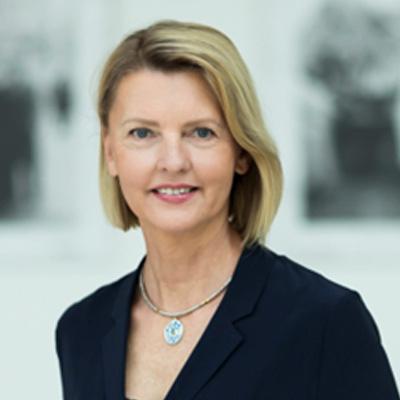
“In 2007, one of the first articles to conceptualize global health diplomacy defined it as the practice of conducting negotiations in a complex, multi-level and multi-actor environment that shapes people’s health (Kickbusch et al., 2007). In 2024, in an even more complex context marked by wars, climate change and deepening inequalities a group with representatives from all regions of the world, convened under the leadership of the University of Memphis, went further on this understanding by proposing that diplomacy is needed at all levels of public health to build a more equitable world This initiative rerepresents a timely and significant step toward reaffirming the role of dialogue and consensus-building in addressing today’s most pressing global health challenges, ” said Dr. Erica Kastrup, South-South cooperation analyst, PAHO/WHO Collaborating Center for Global Health and South-South Cooperation, vice-presidency of Global Health and International Relations, Oswaldo Cruz Foundation.
“In an increasingly interconnected world, at the time for severe geopolitical challenges, the health of populations transcends borders. Public health diplomacy is an essential tool in addressing cross-border health threats, from pandemics to climate change and health inequities. Schools of public health worldwide play a pivotal role in advancing public health diplomacy by fostering transnational collaboration, conducting research that informs global policy and training the next generation of health leaders to act with scientific rigor, cultural sensitivity and ethical integrity. Universities should serve as critical nodes in global health networks, enabling data sharing, policy development and coordinated response strategies Through education, advocacy and engagement with governments, international agencies and civil society, schools of public health help shape a healthier, more equitable and more secure world. Therefore, we ask both national and international leaders to support the schools of public health and emphasize their role in the contributions to peace, health equity and sustainable development, ” said Dr. Ramunė Kalėdienė, head of the Department of Health Management, Medical Academy, Lithuanian University of Health Sciences
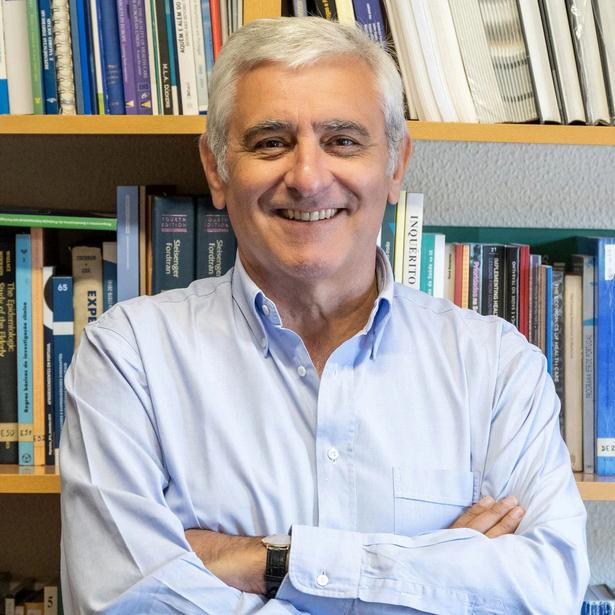
“ASPHER has been pleased to have the opportunity to collaborate with the University of Memphis and ASPPH on building capacity for public health diplomacy starting from the Public Health Diplomacy Summit led by Dean Ashish Joshi in 2024 and attended by ASPHER Executive Board diplomacy lead Prof. Ramune Kalediene. Together, we are now looking forward to furthering this agenda in the European sphere with a dedicated session on the topic during the European Health Forum Gastein (EHFG), September 30 - October 3, 2025. EHFG is an annual high-level health policy platform bringing together stakeholders and decision-makers from public and private sectors, civil society, science and academia for discussion and advancement of health, solidarity and equity in the EU and beyond.
“Recognizing the increasingly important role of health in relation to other political issues such as trade, security, equity, development, and human rights, the
session will seek meaningful and bold solutions to prepare a cadre of committed Public Health Diplomats to facilitate data driven dialogue, and evidence-informed communications with multiple stakeholders in a complex environment In addition to the main session, a lunch will be held with invited high-level stakeholders and a skills building workshop will be featured for Young Forum Gasteiners. The outcomes of the EHFG session and high-level consultation will be published as a statement in an upcoming special collection on public health diplomacy in the journal Public Health Reviews, guest edited by Dean Joshi and Prof. Kalediene. Given the challenges to cooperation from increasing geopolitical tensions and rising nationalism, there has never been more of a need to mobilize for public health diplomacy, ” said Dr. Henrique Barros, ASPHER President

University of Memphis | School of Public Health
Going Beyond Memphis
November 2024
Established Public Health
Diplomacy Steering Group
The Public Health Diplomacy Steering Group serves as a global platform for collaboration among academic institutions, public health professionals, policymakers and civil society organizations. Its primary aim is to advance the field of public health diplomacy by fostering dialogue, sharing best practices and developing competencies essential for addressing global health challenges.
Through these initiatives, the Steering Group aims to strengthen the integration of diplomacy in public health practice, ensuring that health considerations are central to international relations and policy decisions.
December 2024
ASPPH Webinar on
Global Public Health Diplomacy
As part of the ASPPH webinar series, Dean Joshi served as a panelist in a discussion highlighting the critical importance of global public health diplomacy and exploring contemporary strategies to advance it, particularly in preparing the future public health workforce. In an increasingly interconnected and interdependent world, health diplomacy is essential for building trust and driving effective public health advocacy and action. During the session, speakers shared insights on opportunities for collaborative academic engagement and highlighted evolving approaches to public health diplomacy, both in the U.S. and around the world.

April 2025 Published Findings of Public Health Diplomacy Summit
The Public Health Diplomacy paper has been published in Frontiers, a publisher of peer-reviewed articles in openaccess journals, "Public health diplomacy: summary of the methods and outcome of the 1st University of Memphis School of Public Health Diplomacy Summit" . The three-day inaugural summit was organized at the University of Memphis School of Public Health, bringing together 29 participants from 15 countries including representatives from the WHO, the World Federation of United Nations Associations and seven regional public health associations to identify strategies and competencies essential for advancing public health diplomacy.
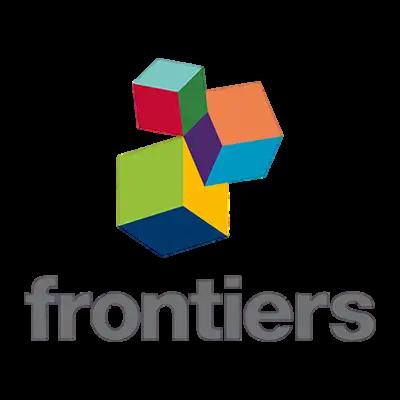


University of Memphis | School of Public Health
Public Health Diplomacy Around the Globe
May
2025
Public Health Diplomacy Lab at the University of Memphis School of Public Health Participates in Regional World Health Summit
Dean Joshi was the moderator for the session “Public Health Diplomacy: An Emerging Public Health Competency Towards Consensus Building, Negotiations, and Multilateral Partnerships” at the World Health Summit Regional Meeting in New Delhi, India. The session focused on the complex and interconnected challenges facing public health today, many of which require policy-driven solutions that tackle the broader social and environmental determinants of health. Diplomacy — the art and practice of negotiation — enables nations to implement foreign policy, safeguard their interests and foster cooperative relationships.
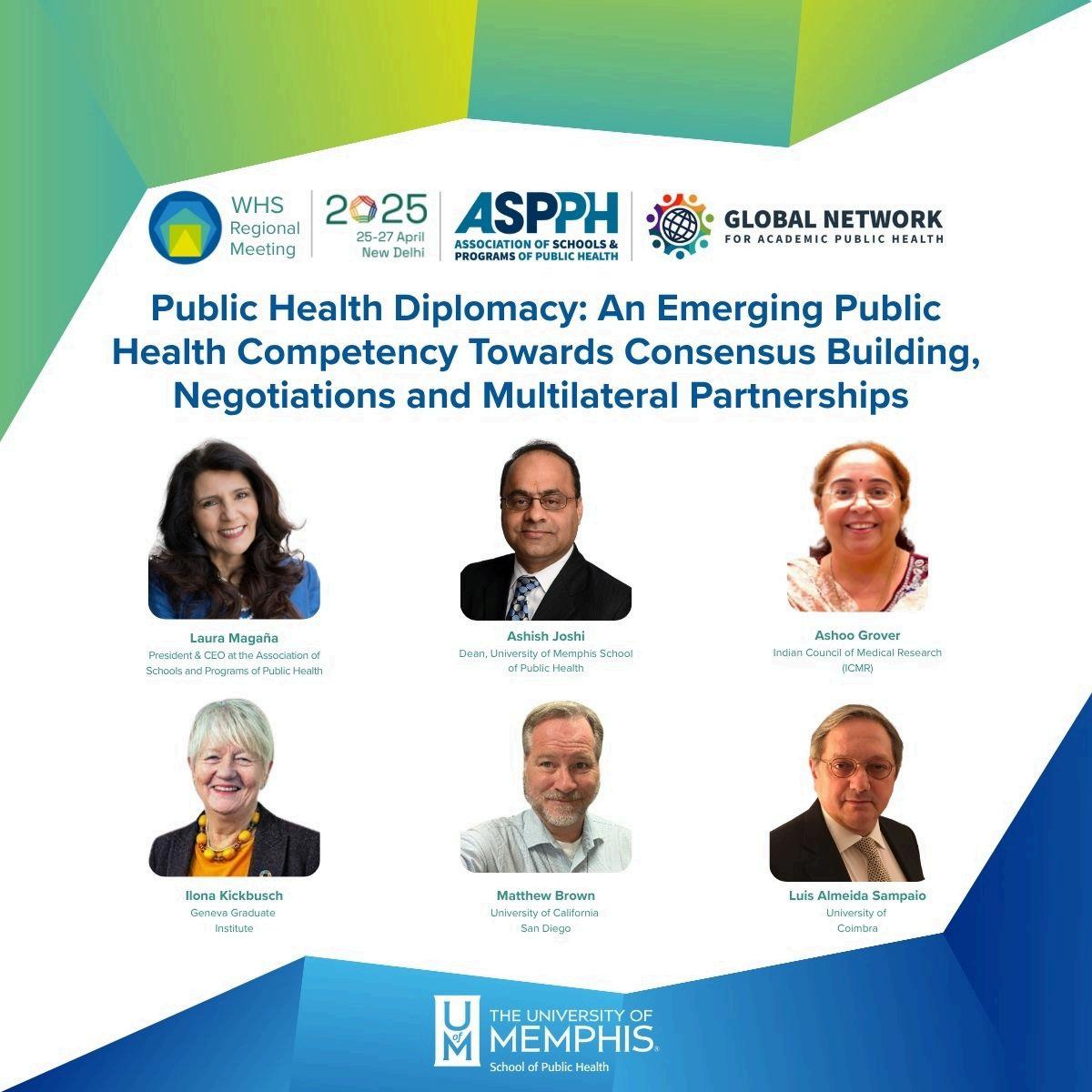


June 2025 Dean Ashish Joshi Invited to Present at the ASPHER Deans’ and Directors' Retreat
Organized in partnership with the Global Network for Academic Public Health (GNAPH), Dean Ashish Joshi presented at the Public Health Diplomacy: Global session at the ASPHER 2025 Deans’ and Directors’ Retreat in Berlin, Germany. Dean Joshi was the keynote speaker for the Public Health Diplomacy Labs as a powerful solution to prepare a cadre of public health professionals with the capacity to comprehensively connect socio-political life through health and advocate for engagement across disciplines.

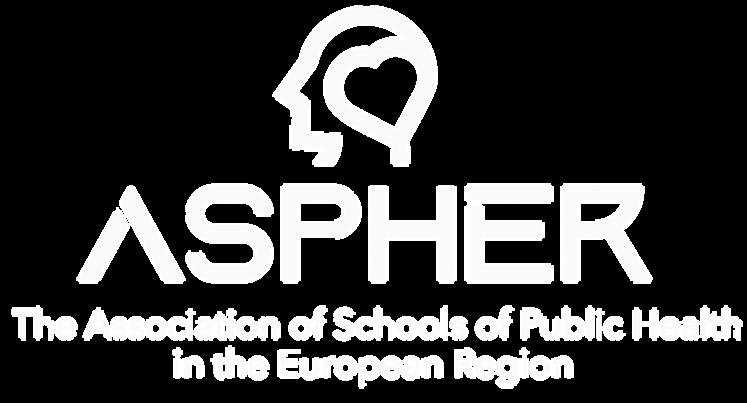

2025DEANS'&DIRECTORS'RETREAT HostedbyBerinSchoo ofPublicHealth
University of Memphis | School of Public Health
The Path Forward
July 2025 International Public Health Diplomacy Advisory Group Established
The International Public Health Diplomacy Advisory Group is established with the Public Health Diplomacy Lab at the UofM School of Public Health brings together global health leaders, diplomats and policy experts dedicated to advancing the intersection of public health and international relations The responsibility of the advisory group is to offer strategic guidance, promote cross-border collaboration and help shape the Lab’s efforts to train future health diplomats.

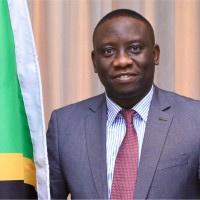
Janilza Silveria Silva
Former Public Health Specialist, Cabo Verde
Ntuli Angyelile Kapologwe Director General, Tanzania
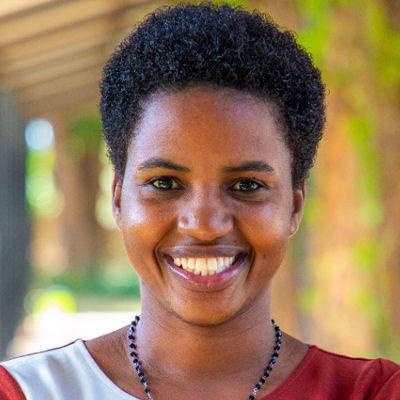

Julietha Gosbert Tibyesiga
Youth Advocate Tanzania

Luís de Almeida Sampaio Former Ambassador, Portugal
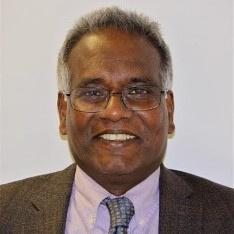
Shiva Murugasampillay
Medical Officer, Zimbabwe
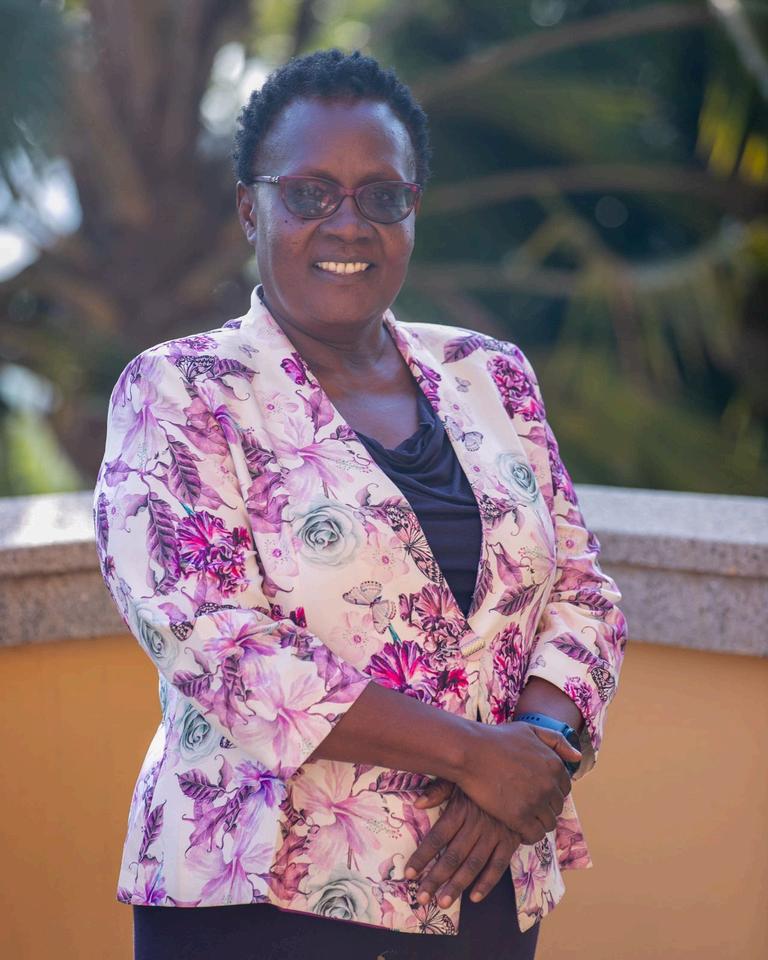
Kibaru-Mbae
Former Director General, Kenya
Josephine
August 2025

Joined the Health Diplomacy
Institutional Network
The University of Memphis joined the Health Diplomacy Institutional Network, expanding its engagement with global health diplomacy initiatives. The HD Diplomacy Institutional Network is an international alliance of academic institutions dedicated to advancing the field of health diplomacy by strengthening the academic and practical foundations of global health diplomacy and providing a global platform for collaborative innovation. The network fosters collaboration among universities and research centers worldwide, spanning regions such as Africa, the Americas, Asia, Europe, the Middle East and Oceania. Key priorities include academic collaboration, interdisciplinary research and innovation, the support of professional development, health policy and advocacy at regional and global levels and the expansion of global outreach by building partnerships with governments and organizations.
September 2025
Quarterly Publication Launched
In accordance to point nine from the summit’s action items, the School of Public Health created this publication to disseminate recommendations from participants to their respective institutions to move forward. It will be published quarterly, sharing Public Health Diplomacy in action around the world.

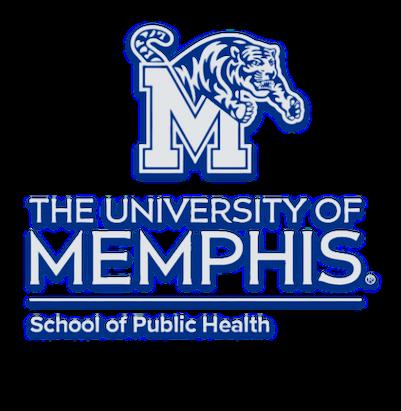
University of Memphis | School of Public Health
Upcoming Events
October 2025
European Health Forum Gastein: Public Health Diplomacy
ASPHER has been pleased to have the opportunity to collaborate with the University of Memphis and ASPPH on building capacity for public health diplomacy starting from the Public Health Diplomacy Summit led by Dean Ashish Joshi in 2024. Together, we are now looking forward to furthering this agenda in the European sphere with a dedicated session topic during the European Health Forum Gastein (EHFG), Sept 30 – Oct 3, 2025 EHFG is an annual high-level health policy platform bringing together stakeholders and decision-makers from the public and private sector, civil society and science and academia for discussion and advancement of health, solidarity and equity in the EU and beyond.




October 2025 World Health Summit: Berlin, Germany & Digital
The annual World Health Summit brings together global health stakeholders from all sectors and regions to find solutions for the most pressing health challenges from Oct. 12-14. In 2025, it takes place under the theme "Taking Responsibility for Health in a Fragmenting World. ”
Across three conference days, the World Health Summit sparks exchange, generates insights and catalyzes science-based and interdisciplinary solutions.

University of Memphis | School of Public Health
UofM SPH Student Presentations




November 2025 Making the Public’s Health a National Priority



The American Public Health Association (APHA) annual meeting and exposition is focusing on public health efforts to prevent disease are more cost effective - and humane - than treating chronic health conditions, so now is the time to invest in our nation’s health. Health is a human right; let’s make it a national priority.




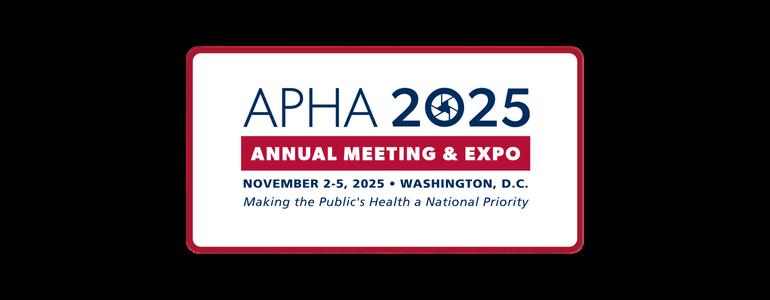














The Role of Health Diplomacy in Global Health Crises, Conflicts and Peace-Making



Health diplomacy, the intersection of global health and international relations, plays a crucial role in addressing transnational health challenges. It facilitates cooperation among governments, international organizations and stakeholders to strengthen health security, equity and crisis response. In the face of growing global health crises, diplomatic efforts are essential for resource mobilization, policy coordination and capacity building The goal of this study is to review the extant literature to examine the role of health diplomacy in global health crises, conflicts and peace-making, focusing on key actors, strategies and challenges to enhance future emergency preparedness and response. This scoping review followed the Arksey and O’Malley framework to systematically map the role of health diplomacy in global health crises and conflicts.




Advancing Public Health Diplomacy Through Public Private Partnerships
Health diplomacy is now an important part of global health governance because it helps countries work together, shapes health policies and builds partnerships across borders. Health diplomacy through public-private partnerships (PPPs) has become more important as globalization continues to link public health challenges. PPPs are particularly effective in enhancing disaster preparation and promoting health equity. Despite its increasing significance, there is an absence of thorough scholarly research that integrates the essential attributes of health diplomacy and its multidimensional influence on health outcomes at local, global and glocal levels











University
Ongoing Projects
Health Diplomacy in Practice: A Scoping Review of Types, Interventions and Applications in the Medical and Public Health Fields
Health diplomacy is increasingly recognized as a critical mechanism for advancing global health goals, fostering international collaboration and addressing complex cross-border health challenges Despite growing interest, the scope and practical applications of health diplomacy across medical and public health fields remain fragmented and underexplored. This scoping review aims to map the existing literature on health diplomacy, categorizing its types, interventions and practical applications within medical and public health contexts.
Digital Health Diplomacy in the Public Health Landscape: A Scoping Review of Concepts, Practices, and Impact
Digital health diplomacy (DHD) has become a critical element in global health governance. It represents a diplomatic practice of science that uses digital technology within health diplomacy operations. DHD serves as an innovative framework that strengthens international partnerships for solving critical health problems while enhancing global health governance There is a need to investigate how digital health diplomacy functions and shapes global health governance and international health collaboration.
Contact

For More Information on Public Health Diplomacy:
Ashish Joshi | PhD, MBBS, MPH
Lead Investigator | Public Health Diplomacy Lab
University of Memphis School of Public Health
ashish.joshi@memphis.edu

